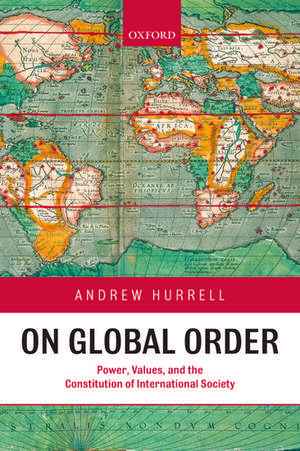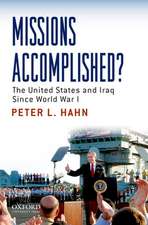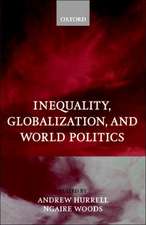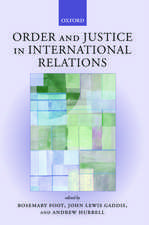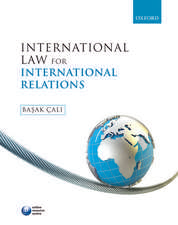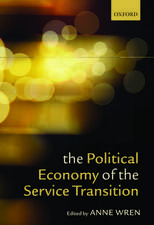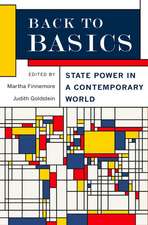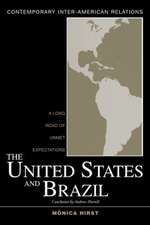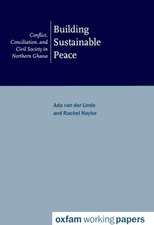On Global Order: Power, Values, and the Constitution of International Society
Autor Andrew Hurrellen Limba Engleză Hardback – 8 noi 2007
| Toate formatele și edițiile | Preț | Express |
|---|---|---|
| Paperback (1) | 269.81 lei 31-37 zile | |
| Oxford University Press – 8 noi 2007 | 269.81 lei 31-37 zile | |
| Hardback (1) | 332.28 lei 31-37 zile | |
| OUP OXFORD – 8 noi 2007 | 332.28 lei 31-37 zile |
Preț: 332.28 lei
Preț vechi: 442.13 lei
-25% Nou
Puncte Express: 498
Preț estimativ în valută:
63.58€ • 66.38$ • 52.62£
63.58€ • 66.38$ • 52.62£
Carte tipărită la comandă
Livrare economică 25-31 martie
Preluare comenzi: 021 569.72.76
Specificații
ISBN-13: 9780199233106
ISBN-10: 0199233101
Pagini: 364
Dimensiuni: 163 x 241 x 26 mm
Greutate: 0.7 kg
Editura: OUP OXFORD
Colecția OUP Oxford
Locul publicării:Oxford, United Kingdom
ISBN-10: 0199233101
Pagini: 364
Dimensiuni: 163 x 241 x 26 mm
Greutate: 0.7 kg
Editura: OUP OXFORD
Colecția OUP Oxford
Locul publicării:Oxford, United Kingdom
Recenzii
This is one of the finest books on the normative dimension of global governance published in the past decade. Utilizing insights from the English School, liberal institutionalism, and constructivism, the author addresses some of the most profound questions on the nature, limitations, and possibilities of global order in the twenty-first century...On Global Order should serve as a resource for a wide range of readers, including scholars and students of international relations and international law, international civil servants, diplomats, and journalists.
On Global Order consciously and successfully sets out to e the twenty-first-century version of The Anarchical Society...a major statement and required reading for anyone interested in the theory and practice of international relations.
This book has been eagerly anticipated and it does not disappoint. Its principal concern is with the challenges of global order: capturing shared interests, managing unequal power, and mediating value conflict This is a subtle and challenging book at every level, and its prime characteristic is its consistent eschewal of facile options, either analytical or prescriptive.
Hurrell avows himself explicitly to the tradition of neo-Grotianism established in particular by Hedley Bull and, more generally, by the English School of International Relations. He delivers, however, an essential contribution to the overcoming of a conceptual shortcoming which affected Bull's theory of the 'international society' ... [and] Hurrell consistently improves and substantiates the conceptual instruments traditionally used by the English School of International Relations.
On Global Order consciously and successfully sets out to e the twenty-first-century version of The Anarchical Society...a major statement and required reading for anyone interested in the theory and practice of international relations.
This book has been eagerly anticipated and it does not disappoint. Its principal concern is with the challenges of global order: capturing shared interests, managing unequal power, and mediating value conflict This is a subtle and challenging book at every level, and its prime characteristic is its consistent eschewal of facile options, either analytical or prescriptive.
Hurrell avows himself explicitly to the tradition of neo-Grotianism established in particular by Hedley Bull and, more generally, by the English School of International Relations. He delivers, however, an essential contribution to the overcoming of a conceptual shortcoming which affected Bull's theory of the 'international society' ... [and] Hurrell consistently improves and substantiates the conceptual instruments traditionally used by the English School of International Relations.
Notă biografică
Andrew Hurrell is Director of the Centre for International Studies at Oxford University and a Fellow of Nuffield College, Oxford. He has written extensively on international institutions and governance at both the global and regional levels and on the role of major developing countries in contemporary international relations.
